If imitation is the sincerest form of flattery, Ford Motors is complementing the heck out of Tesla with the Mustang Mach-E. Ford has announced what some might have thought would never exist – the development of an all-electric Ford Mustang. Going by the specifications this could be an amazing car, that could erase all the doubts we’ve had over Ford’s seriousness about electric vehicles. With performance and driving range you’d expect from a Tesla, and certain design elements as well, Ford was clearly inspired by Tesla’s success in selling electric cars.
For years we’ve had to roll our eyes as Ford touted their electrified cars. As best as I remember, Ford was the first company to use the phrase “electrification” and it has caused plenty of confusion with people thinking they’re hearing a car company promising electric cars when the “electrification” promise actually means hybrid cars. For Ford, the electrification word applied to the C-Max hybrid, Fusion Hybrid, and some other cars, as well as all electric cars like the Ford Focus Electric. But, despite the frequency they used this word, none of their efforts were terribly inspiring. The Ford Focus Electric was a very good electric car in 2012, but Ford did not sell many of them, and it didn’t see many updates.
All this changes with the Mustang Mach-E (read the Mach-E press release![]() ). Due to go on sale in late 2020 (as the 2021 Mustang Mach-E) it will have an electric range up to around 300 miles, and some variants have performance befitting a car labeled with the Mustang brand name. The Mustang Mach-E GT Performance edition is expected to do 0-60 miles/hr in the mid-3-second range. We’re talking Tesla territory with acceleration like that.
). Due to go on sale in late 2020 (as the 2021 Mustang Mach-E) it will have an electric range up to around 300 miles, and some variants have performance befitting a car labeled with the Mustang brand name. The Mustang Mach-E GT Performance edition is expected to do 0-60 miles/hr in the mid-3-second range. We’re talking Tesla territory with acceleration like that.
A detour into Mustang purism
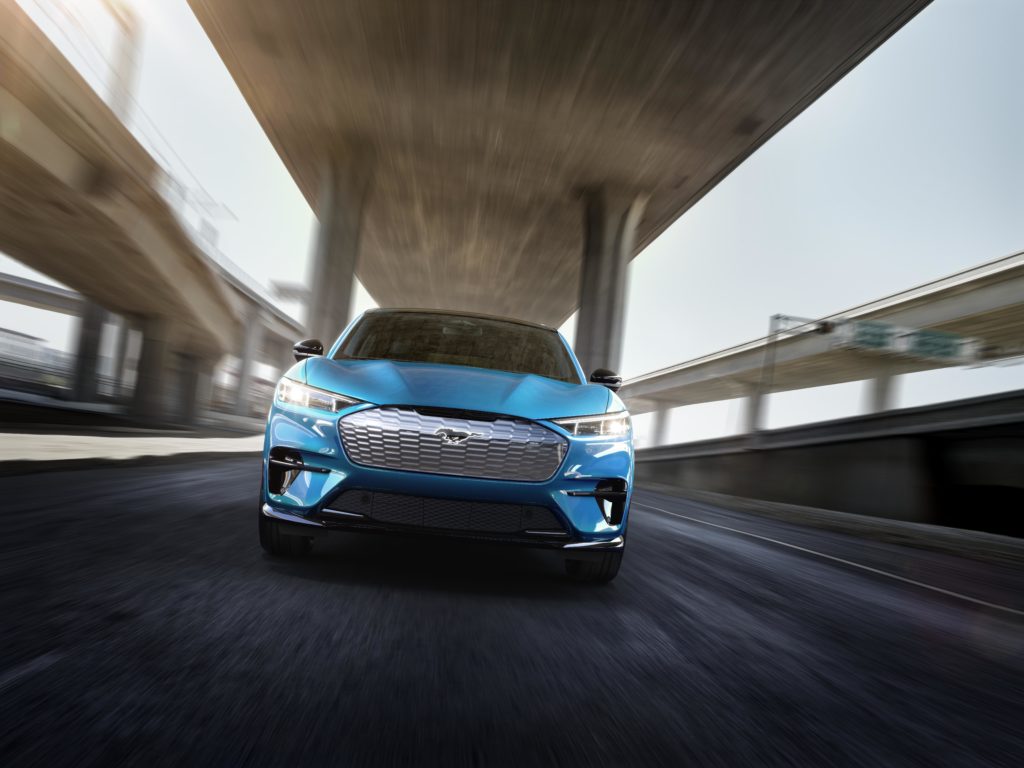
Before going any further, I need to get one thing off my mind. In the distant past I owned a 1966 Mustang, or maybe a 1965, and my father owned a 1967 Mustang. At one time he owned a whole warehouse of Mustang parts. We were big fans of the Mustang. This car, well, I’m having a hard time calling it a Mustang. There are certain style elements – the galloping pony on the front, this time without a corral, and the three vertical stripes on each tail-light, that are part of the Mustang Look. One element, the fake air intakes on the side, is missing. But those style elements are not what makes a Mustang a Mustang. How the heck can we call an SUV — the Mustang Mach-E is an SUV — a Mustang? Mustang’s are supposed to be sports cars, not behemoth SUV’s.
It’s kind of like what Volkswagen did to the Beetle when they created the New Beetle. It’s a caricature of an iconic car.
Basically – yes, it is a nice looking car, that happens to be electric, and it happens to have some excellent specifications. I’ll call it a Mustang because that’s the label Ford put on it, but that doesn’t make it a Mustang in my book.
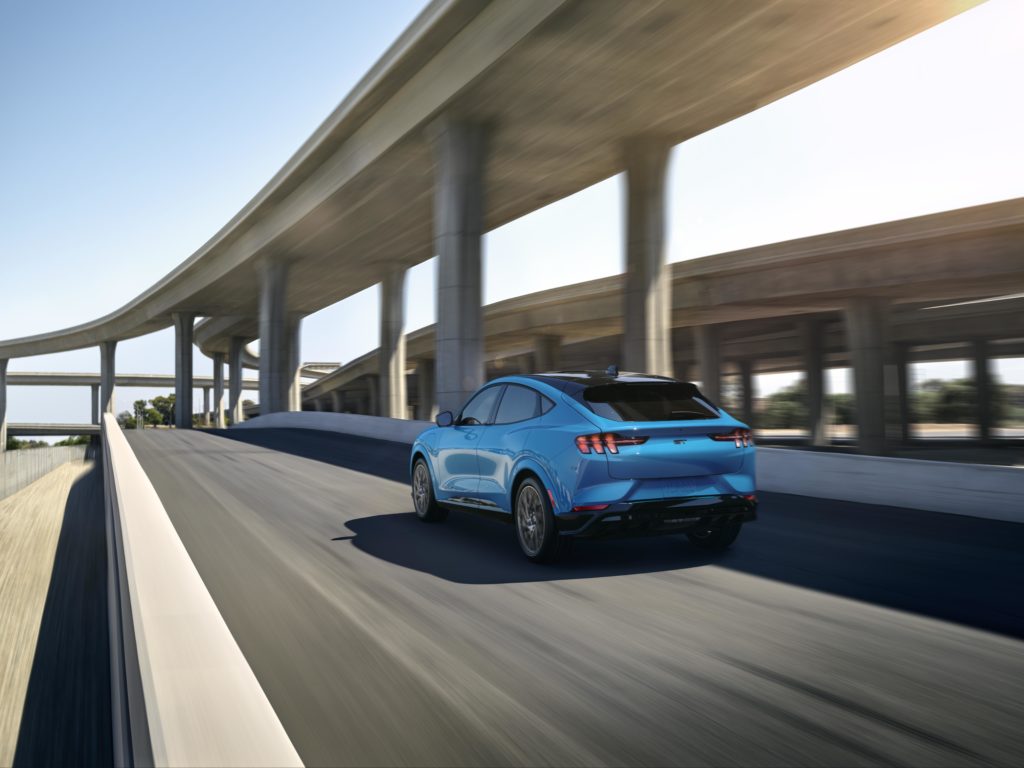
Mach-E Model Selection
The Mustang Mach-E will come in six varieties, with launch dates starting in late 2020. As Tesla has done, Ford will start with a “First Edition” available in limited quantities, then move on to a “Premium Edition”, both of which are slated for availability in late 2020. The what should be cheaper “Select Edition” follows in early 2021, along with an edition labeled “California Route 1” and a “GT” edition.
Full details to this are in the Mustang Mach-E Technical Specifications![]() .
.
It will be supplied with one of two battery pack sizes – 75 kiloWatt-hours and 100 kiloWatt-hours. In the 75 kWh model estimated range is 230 miles, and the 100 kWh model estimated range is around 300 miles. Except, that is, for the GT edition, where the 100 kWh estimated range is 230 miles. That higher speed obviously comes with a tradeoff in range?
The 0-60 time similarly varies from 6 seconds down to mid-3-seconds depending on the edition.
The cargo space includes another big flattery to Tesla and for that matter Volkswagen. So far as I know it was Volkswagen that invented the Front Trunk, however it was Tesla that made it popular. And, lo-and-behold, the Mustang Mach-E has a Front Trunk of 4.8 cubic feet. Behind the rear seats is 29 cubic feet of cargo space, and if the rear seats are lowered cargo space increases to 60 cubic feet. I suppose being an SUV has its advantages, since old school Mustangs certainly did not have much cargo capacity.
Borrowing design ideas from Tesla
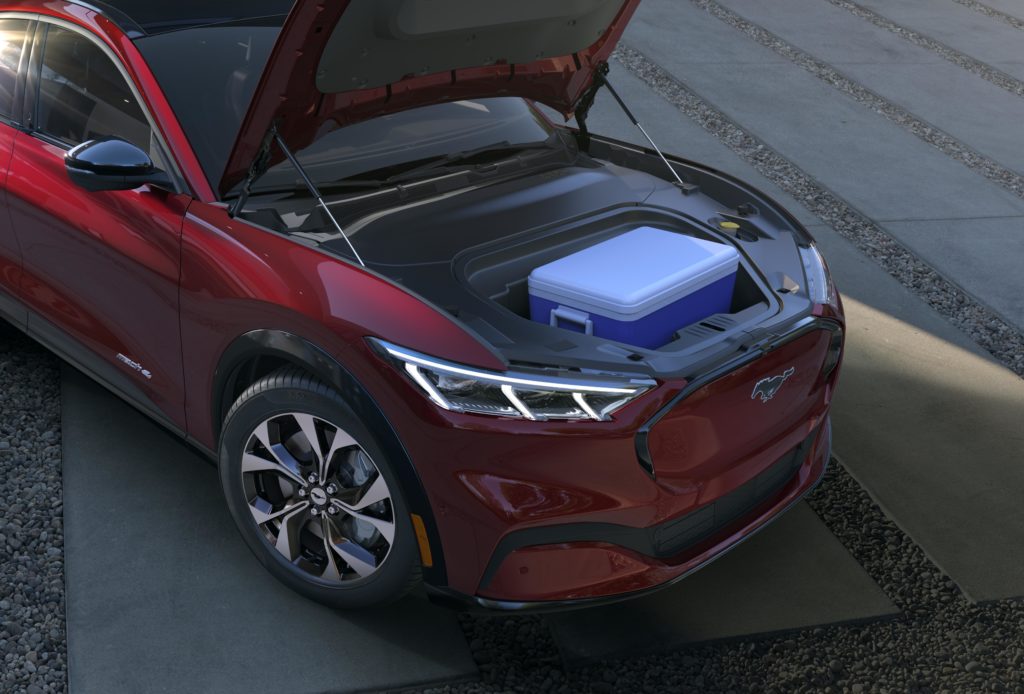
And while we’re talking about nods to Tesla’s product choices:
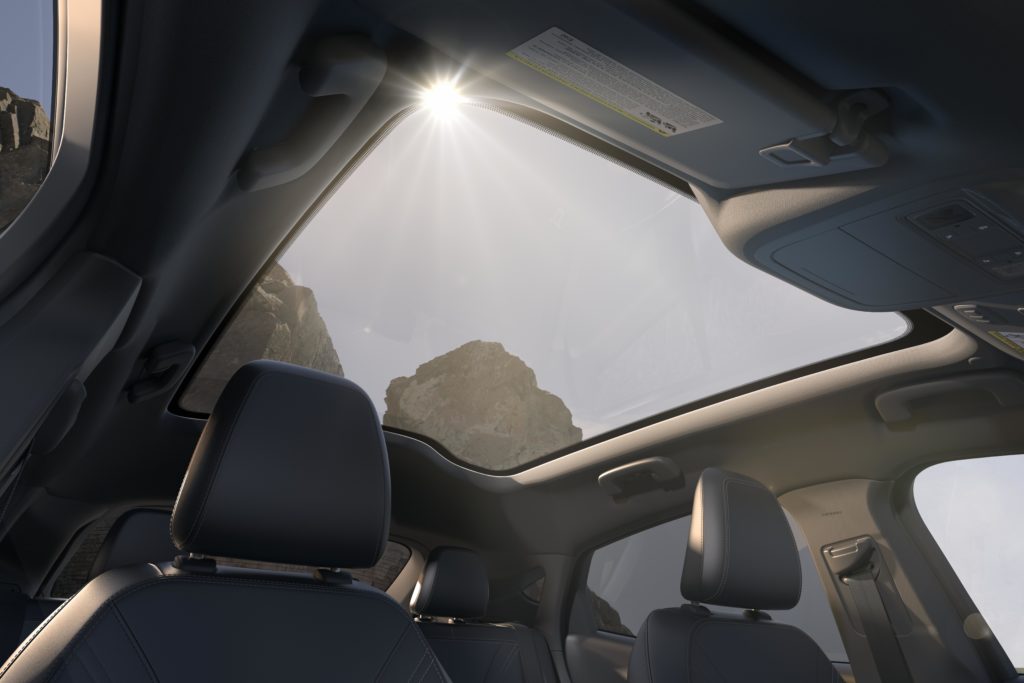
Yes, that is a panoramic glass roof just like the one on the Tesla Model 3.
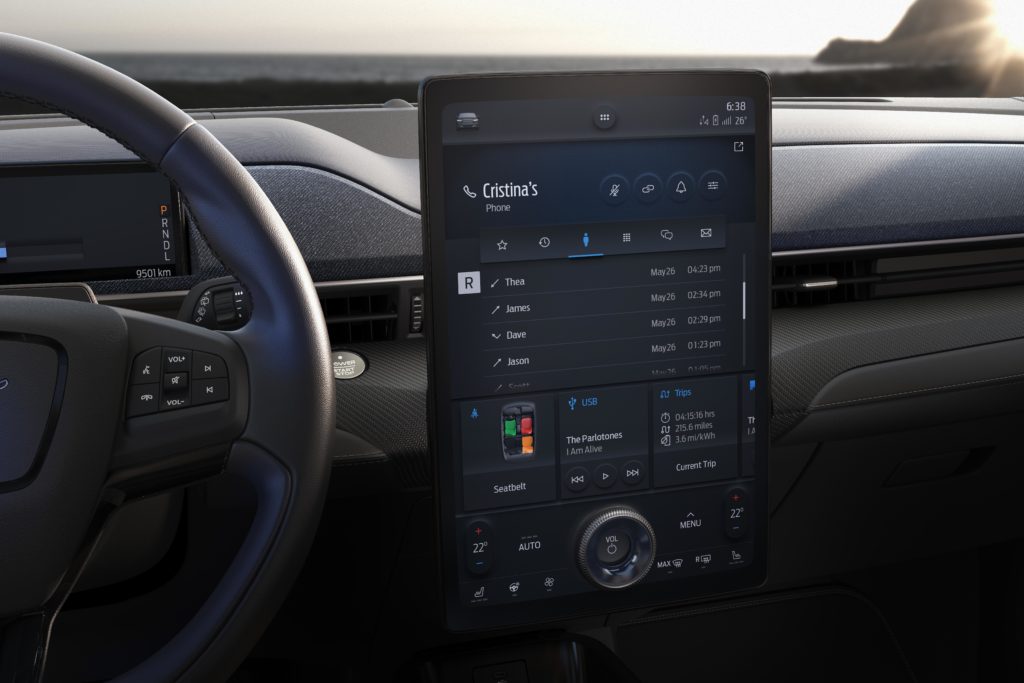
And, if the above weren’t enough, Ford put in a large touch screen display in the middle of the dashboard. It doesn’t follow the minimalistic style of the Tesla Model 3. There is a proper dashboard in front of the driver, along with some buttons and paddles on the steering wheel. That much is typical for any car from most automakers, but this kind of large touch screen is direct from Tesla’s playbook.
It is a 15.5″ display panel. The software, SYNC, includes some AI elements as in … “Next-generation SYNC actively starts adapting to you as soon as you start using it, quickly learning your preferences and making personalized suggestions,” said Darren Palmer, Ford global director for battery electric vehicles. “It can suggest going to the gym if it learns Mondays are workout days or calling home if you do that every day after work. The result is a cloud-connected assistant and interface that’s intuitive, beautiful and ready for the future thanks to fast over-the-air updates.”
Battery and charging system
In addition to offering up to 300 miles driving range, Ford put some good things in the battery system.
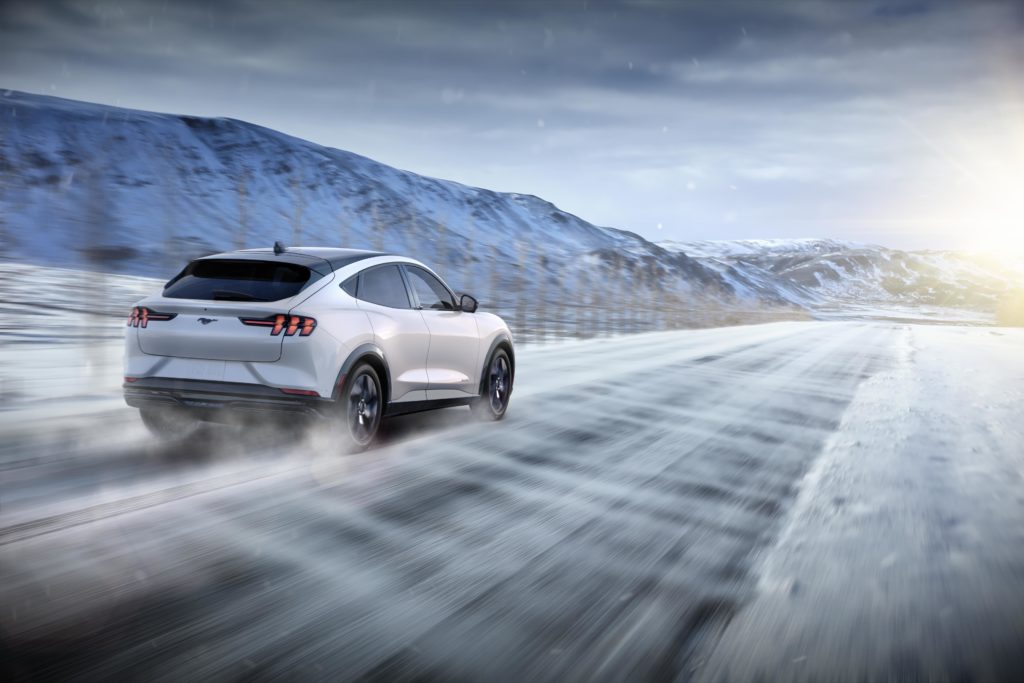
The Mustang Mach-E has been tested in temperatures as cold as minus 40 degrees Fahrenheit. The battery pack is in a waterproof case with crash-absorption protection. And there is a liquid cooling system which Ford wants us to believe “optimize performance in extreme weather and to improve charging times.” But, those features will assuage any fears of former Nissan Leaf owners who suffered from early battery capacity degradation because Nissan did not put any cooling system.
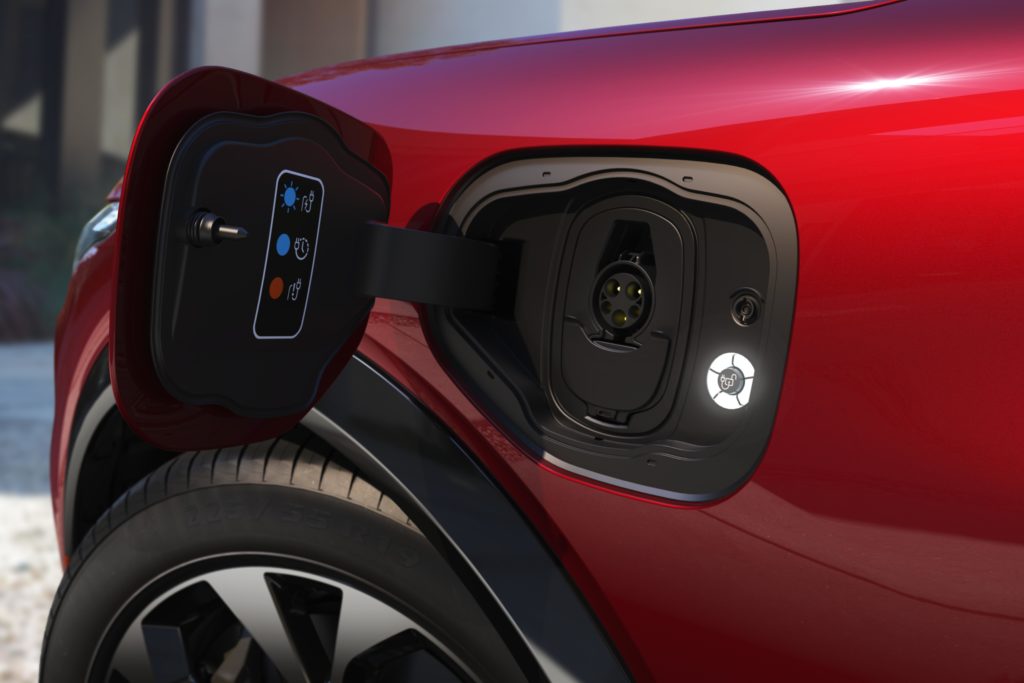
For AC Level 2 charging, Ford supports a higher-than-typical charging rate. The press release says that with the “Ford Connected Charging station that can add an estimated average range of 32 miles per charging hour on a 240V outlet”. What that actually means is it supports at least a 40 amp charge rate – at a 32 amp charge the rule of thumb is 20-25 miles range per hour of charging, so 32 miles means at least 40 amps.
The supplied mobile charger is likewise better-than-typical. Rather than being a simple 120 volt compact charger, it supports adding an estimated average range of 22 miles per charging hour on a 240V outlet. That means it supports a 24 amp charge rate. Ford did not say whether it also supports 120 volt charging.
For DC Fast Charging, a.k.a. DC Level 2 charging, it uses the Combo Charging System (CCS) and a peak rate of 150 kiloWatts. In the extended battery model that will mean about 47 miles range in approximately 10 minutes of charging. But as a practical matter expect the charge rate to taper off pretty quickly.
Summary
Ford seems to have woken up and is offering a very credible electric car.
This is not the Ford Motors of a couple years ago that gave lip service to electric drive. This is different, and very interesting. Please, Ford, manufacture enough of these to make a serious impact, and please Ford, build some more electric cars of this ilk.
- The USA should delete Musk from power, Instead of deleting whole agencies as he demands - February 14, 2025
- Elon Musk, fiduciary duties, his six companies PLUS his political activities - February 10, 2025
- Is there enough Grid Capacity for Hydrogen Fuel Cell or Battery Electric cars? - April 23, 2023
- Is Tesla finagling to grab federal NEVI dollars for Supercharger network? - November 15, 2022
- Tesla announces the North American Charging Standard charging connector - November 11, 2022
- Lightning Motorcycles adopts Silicon battery, 5 minute charge time gives 135 miles range - November 9, 2022
- Tesla Autopilot under US Dept of Transportation scrutiny - June 13, 2022
- Spectacular CNG bus fire misrepresented as EV bus fire - April 21, 2022
- Moldova, Ukraine, Georgia, Russia, and the European Energy Crisis - December 21, 2021
- Li-Bridge leading the USA across lithium battery chasm - October 29, 2021











